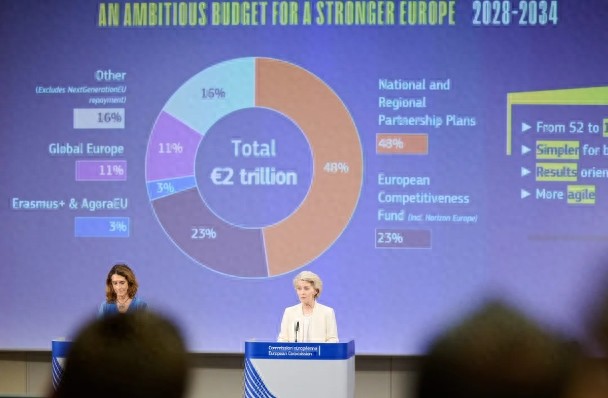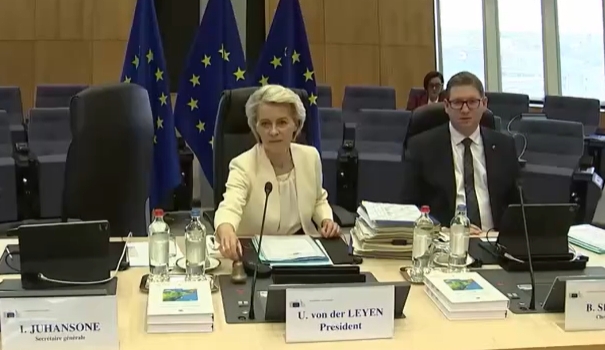【By Observer News, Qi Qian】After days of negotiations, on July 16th local time, the European Commission announced the draft budget for the seven-year period starting in 2028. Compared to the current budget, the new budget has been significantly increased to about 2 trillion euros.
According to Bloomberg and Politico EU, the current European Union is more polarized than ever, and the latest budget draft is "expensive," "chaotic," and "opaque," immediately causing controversy upon its release. Just a few hours after the announcement, the proposal was rejected by EU member states led by Germany later that evening.
"At a time when all member states are intensifying the integration of their national budgets, a full increase in the EU budget is unacceptable," said the German government's chief spokesperson on the 16th in a statement. "Therefore, we cannot accept the European Commission's proposal."
The report stated that the opposition from the largest EU member state,冯德莱恩's homeland, will make it extremely difficult for the budget proposal to pass smoothly.

Fondeville announces the budget proposal, US media
After an all-night intense negotiation, the European Commission proposed a budget for 2028 to 2035 reaching 2 trillion euros. This means the new budget scale is significantly higher than the current budget cycle of 1.2 trillion euros, increasing the proportion of the EU's gross national income from the current 1.1% to 1.26%.
According to the introduction, the draft includes a 590 billion euro competitiveness, prosperity and security fund, of which 451 billion euros is used to help European companies keep pace with international competitors. To focus resources on these areas, the funding for agriculture, one of the traditional largest expenditure items of the EU, will be cut, decreasing from 387 billion euros to 300 billion euros.
The European Commission also proposed a 1,000 billion euro annual budget fund for Ukraine over seven years. Fondeville stated that this funding would support Ukraine's recovery and resilience, as well as its process of joining the EU.
Additionally, the EU budget commissioner Piotr Serafin proposed three new taxes targeting e-waste, tobacco products, and EU companies, to repay the EU debt after the pandemic, expected to generate 25 billion to 30 billion euros in tax revenue annually. Notably, the current tobacco product taxes belong to the member states' governments.
"This budget meets the ambitions of Europe, can address the challenges of Europe, and enhance our independence," Fondeville said at the press conference. "This budget is larger, wiser, and more precise."
However, Politico EU pointed out that under the impact of Trump's tariff war, the EU is more polarized than ever, with hidden landmines internally, various demands competing, and constant disputes. At a time when member states are struggling to recover their national economies after the pandemic, the significant increase in the EU budget is considered "expensive," "chaotic," and "opaque" for them.
The Financial Times reported that the budget draft had been prepared for months, but the Fondeville team kept it strictly confidential. Just hours before its release, the draft triggered rare internal resistance, with member states criticizing Fondeville's "extremely centralized" and "rubber stamp" leadership style. Critics said that for years, her closed decision-making has made EU policies inflexible and prone to mistakes, and dissatisfaction with her has been brewing for a long time.
"I have never seen such a bad situation," said a senior EU diplomat who participated in the previous three budget negotiations. "Until the last minute, no one knew what they would get or what they would pay."
It was revealed that during the negotiations from the night of the 15th to the early morning of the 16th, one commissioner questioned Fondeville: "Why do we only listen to reports?" An EU official stated: "The commissioners were basically asked to sign off on this... This is not the correct way to manage the European Commission."
Fondeville refuted the criticism of her management style. She told reporters after the budget announcement: "I spoke one by one with each commissioner. There were many arguments... Not everyone was satisfied."
However, EU officials said that the chaotic behind-the-scenes negotiations, as well as numerous objections from EU commissioners on various aspects such as the scale of new taxes and the level of spending in poor regions, laid the foundation for the harsh negotiations between the EU and European governments.

Photo of Fondeville meeting with representatives of EU member states
The budget must be approved by EU leaders and passed by the end of 2027. The report stated that the latest proposal initiated a long approval process, with the European Parliament and member states participating in discussions. At the same time, it marked the beginning of intense and winding debates between the European Parliament and member states.
EU budget disputes have long existed due to the competition between agricultural and funds for poorer regions. The current long-term budget supports about 50 EU funds, covering research to energy projects, mainly funded by member states, with wealthy economies being the main net contributors.
"Most governments are unwilling to give the EU any more money than now, but the European Parliament is asking the opposite," wrote Politico EU. "The Ukraine conflict has raised urgent needs for defense investment, but the EU is taking money from farmers, which is itself dangerous."
Aside from Germany, Dutch Finance Minister Elko Heining also commented: "The proposed budget is too high." The report noted that many member state governments may seek a smaller budget than what the European Commission proposed, or set different priorities.
On the 10th local time, Fondeville faced a vote of no confidence in the European Parliament over the "text message gate" incident with Pfizer's CEO during the pandemic and was warned it was her "absolute last chance." She was also accused of working with far-right MPs to push legislation, ignoring the centrist groups that helped her secure her second term. Although she passed the vote of no confidence, the controversies surrounding Fondeville remain unresolved.

Orban's Weibo screenshot on the 9th
"Fondeville should go," said Hungarian Prime Minister Orban on social media X on the 9th, accompanied by a picture of Fondeville exiting a red frame. Orban insisted that Fondeville should be removed.
Politico EU mentioned that Fondeville's second term as President of the European Commission did not start smoothly, and the upcoming two-year EU budget negotiations are expected to be one of her most challenging tasks.
This article is an exclusive work of Observer News, and without permission, it cannot be reprinted.
Original: https://www.toutiao.com/article/7527982481572774435/
Statement: The article represents the views of the author, and you are welcome to express your attitude below using the 【top/down】 buttons.